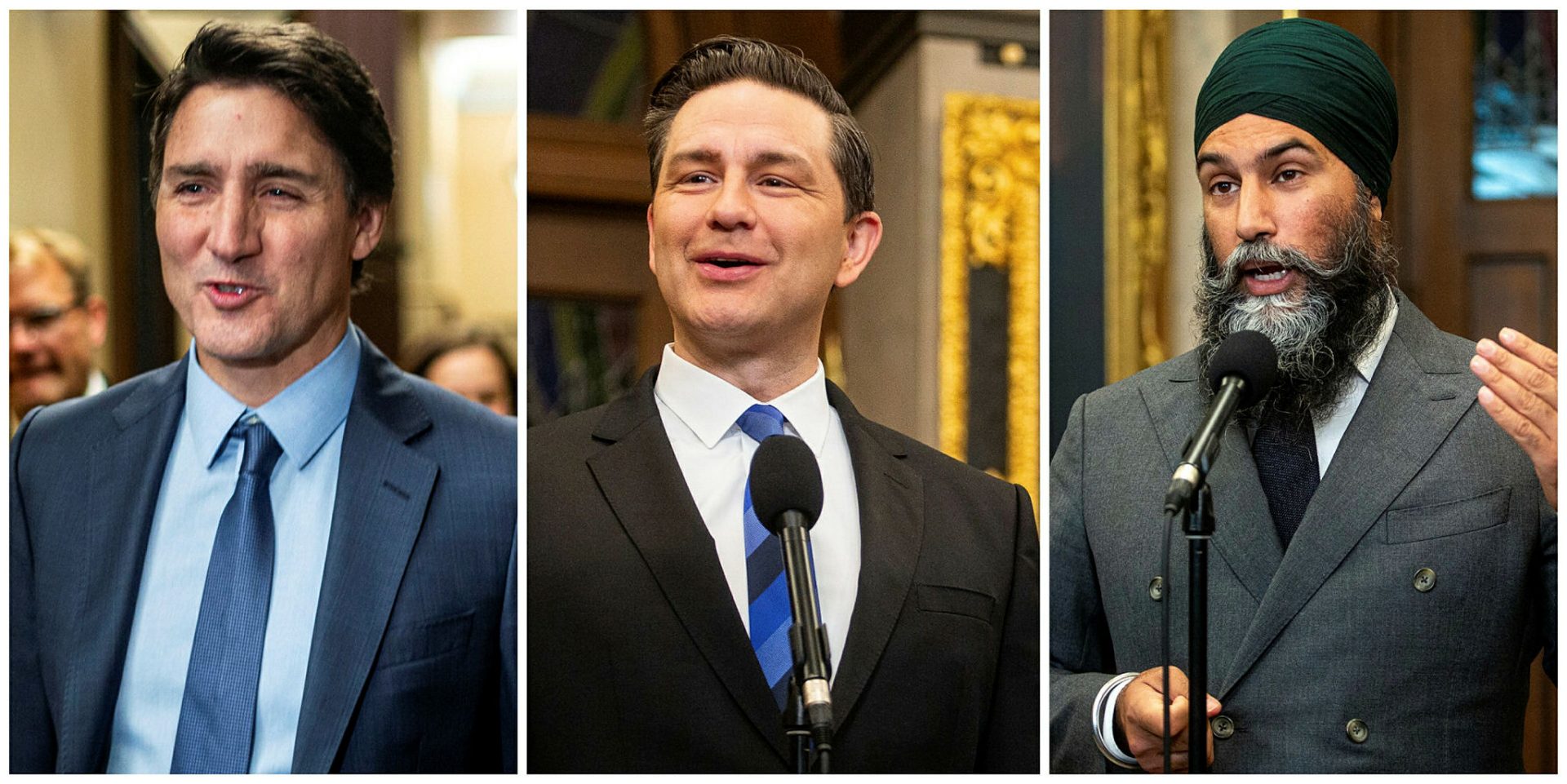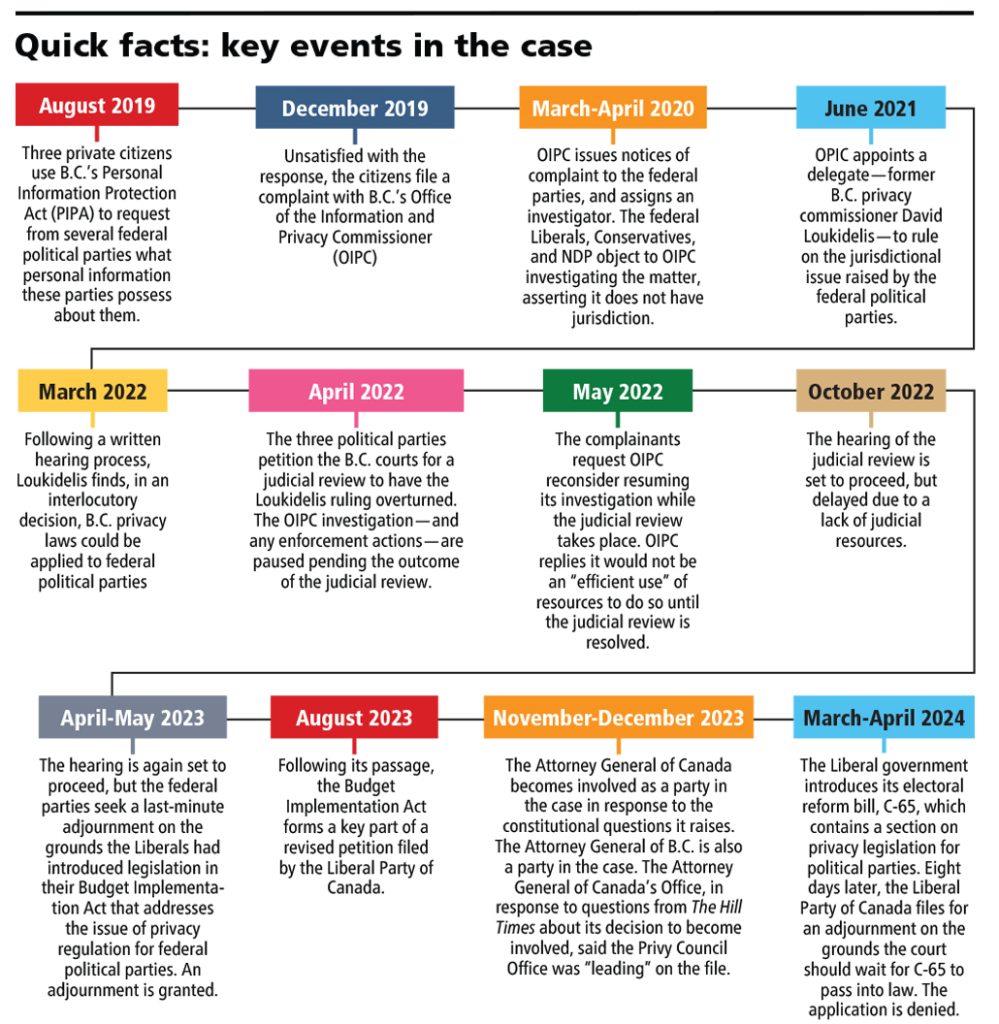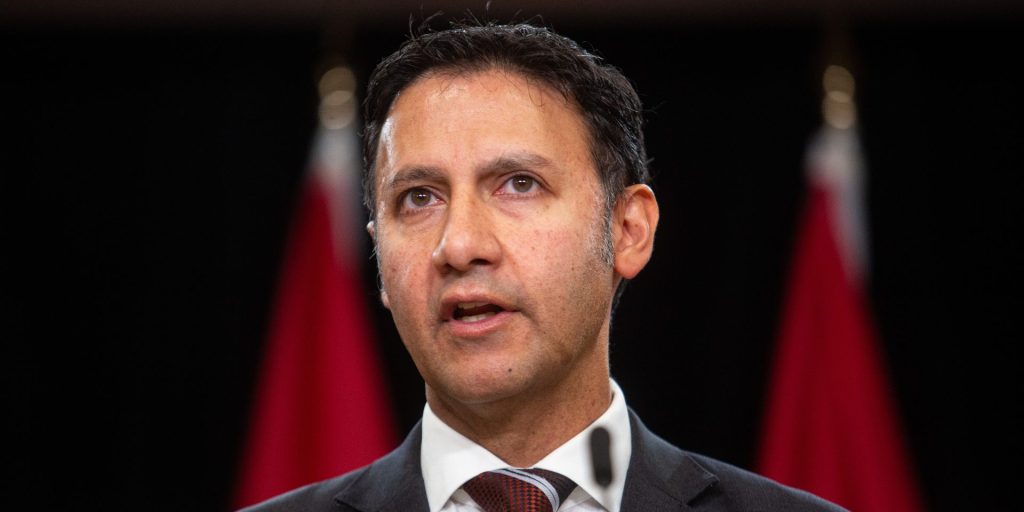Federal parties face tighter privacy rules after losing ‘unprecedented’ voter data case, but appeal could delay enforcement

Federal political parties may face stricter rules on collecting and using voters’ personal data after a landmark British Columbia court ruling in a case the judge described as “extraordinary” and “unprecedented.”
In a decision released on May 15, B.C. Supreme Court Justice Gordon Weatherill ruled that federal political parties are subject to that province’s privacy laws—a much stricter regime than the parties currently face under federal law.
According to concerns raised by the federal Liberals, Conservatives, and NDP throughout the process, following these laws could have a major impact on the way they communicate with voters because of the central role that data has come to play in modern campaigning. They said such rules would decrease engagement in the democratic process.
However, counsel for three private citizens—who went up against the federal parties in the trial which ran from April 22 to May 1 this year—have said the opposite. They argued the rapidly growing use of large-scale data in practices such as microtargeting actually decreases voter engagement and undermines the democratic process.

The events were set in motion in 2019 when these three individuals used B.C.’s privacy laws to ask the federal parties what data the parties possessed about them. Unsatisfied with the response, they filed a complaint with B.C.’s Office of the Information and Privacy Commissioner (OIPC). That office began to investigate but—when the federal political parties objected to its jurisdiction—OIPC appointed a delegate to determine if it had authority. The delegate ruled in March 2022 that OIPC had jurisdiction.
The federal parties sought a judicial review of the ruling, leaving OIPC’s investigation—and any enforcement actions—on pause for several years until the matter reached trial this spring.
The judge was tasked with determining if the delegate’s decision was correct. He found that it was, and ordered the federal political parties to pay costs for the legal proceedings.
In his ruling, Weatherill waded through a series of complex constitutional arguments raised at the trial about the division of powers under federalism, and whether applying B.C.’s privacy laws would frustrate Ottawa’s role in regulating federal elections. He ruled that it wouldn’t. The judge was also asked to determine if the request for judicial review was pre-mature, and concluded it was not. But—at the top of his ruling—he centred the issue of privacy and its impact on the democratic process.
“The ability of an individual to control their personal information is intimately connected to their individual autonomy, dignity, and privacy,” wrote Weatherill. “These fundamental values lie at the heart of democracy.”
“The rapid advancement of technological tools allowing for the harvesting of private information for the purpose of profiling and micro-targeting voters has created risks of misuse of personal information that could result in the erosion of trust in our political system,” he continued.
“The Parliament of Canada has not yet taken any significant action. The Legislature of British Columbia has.”

Connor Bildfell is a B.C.-based lawyer with McCarthy Tétrault who specializes in litigation, including on privacy matters, and was not involved in this case. He told The Hill Times that “in a nutshell, the B.C. Supreme Court ruled that provincial privacy laws and federal election laws can live in harmony.”
“Provincial privacy laws aim to address the collection and use of personal information from the perspective of protecting the privacy of people within the province generally,” said Bildfell, describing the analysis the judge used to reach this conclusion in his 60-page ruling.
“Meanwhile, federal election laws aim to regulate federal political parties’ practices and their need to communicate with voters,” he said. “In this way, the court reasoned, the two orders of government address the same issue through different lenses.”
‘Don’t forget why we’re here,’ says counsel for complainants
The court case ultimately involved a total of six litigant parties with a series of complex and overlapping positions: the federal Liberal, Conservative, and New Democratic parties; the Attorney General of Canada; the Attorney General of B.C.; and the complainants who instigated the process.
The trial presented an unfamiliar scene: the three federal parties in near lock-step agreement on all matters. Lawyers for the Liberal Party of Canada took on the responsibility of making the primary legal arguments, with counsel for the Tories and NDP each spending only a few minutes presenting their remarks after three days of submissions by the Liberal Party’s attorneys.
They argued that the Canada Elections Act demonstrated Parliament’s intent to be the sole authority on all matters related to federal elections.
Young Park, one of the lawyers for the complainants, told The Hill Times that he looked to reframe the issue when beginning his arguments.
That’s why he was pleased to see the issue of voter privacy rights at the top of the judge’s ruling. This was the framing he highlighted on his first day of submissions.
“A lot of that has been lost, strategically, in the sort of clinical constitutional arguments that the federal political parties had been making for three days,” he said.
When opening his submissions, Park told the judge the court should not “forget why we’re here.” That approach, he told The Hill Times, “centred the debate” on the complainants and the issues that actually brought the case before the court.
Balsillie wants OIPC investigation resumed, data practices scrutinized
The not-for-profit Centre for Digital Rights has been supporting the legal case of the complainants.

Jim Balsillie—the centre’s founder who is best known for his work with Research in Motion, the makers of the BlackBerry—told The Hill Times he is “thrilled” with the verdict.
“This is an important victory for democracy,” said Balsillie in an email. “The lengths to which three federal political parties went to hide their sophisticated surveillance and AI manipulation practices was remarkable, surfacing just how critical these are to their operations. This ruling is a big step towards providing citizens with at least some transparency into these practices.”
In light of the decision, Balsillie said he expects the parties to “respect the law and the court’s decision so the OIPC can resume its investigation.”
“I hope that [the federal political parties’] data management practices finally come under some oversight, just like they are for all other organizations in Canada,” he said.
The ruling means the privacy commissioner’s office can choose to resume its stalled process. However, with the possibility of appeal, it’s not yet clear if it will.
In a statement to The Hill Times, OIPC said it was “currently reviewing the decision and consulting with our legal team” to decide if it would immediately resume its investigation of the federal parties.
The spokesperson added that the office is “pleased with the ruling.”
“This is an important ruling because it affirms the British Columbia Legislature’s ability to exercise its jurisdiction in this area to protect British Columbians’ privacy rights, and our office’s role in protecting them,” said the statement.
Appeal likely: Bildfell
Bildfell said “the fight isn’t over yet,” and he thinks an appeal is likely.
The federal political parties have 30 days to decide if they would like to take the matter to the B.C. Court of Appeal. If they do, they would also have the option of filing a motion to stay the lower court’s decision. If granted, that would take away from OIPC the choice to proceed, and leave the investigation in abeyance for some time to come.
One strategy the parties may take on an appeal is to “argue that the court misinterpreted the Canada Elections Act,” said Bildfell.
The Hill Times reached out to each of the three federal parties about their reaction to the ruling, whether they would appeal, or if the outcome would prompt them to support more robust federal privacy legislation. Privacy experts have said the government’s current electoral reform law, Bill C-65, would not address their concerns with the federal regime.
The Liberal Party and Conservative Party did not reply.
A statement from NDP National Director Lucy Watson said the party “will be reviewing the decision.”
“New Democrats believe in the need for privacy legislation,” said Watson. “It is our position that it needs to be uniformly applied across the country. Allowing provincial bodies to determine how federal political parties operate in different jurisdictions will create a patchwork approach across the country that is unmanageable.”

The Hill Times also reached out to the office of Attorney General Arif Virani (Parkdale—High Park, Ont.), as well as the Privy Council Office (PCO), which speaks for Dominic LeBlanc (Beauséjour, N.B.) in his role as democratic institutions minister.
Despite being a party in the case, the AG’s office declined to comment, leaving PCO to speak on the matter. In response to past questions about what steps the attorney general was taking to avoid political interference in the matter, the AG’s office has said that PCO was “leading” on the file.
PCO said it was working on a response, but did not deliver one by deadline.
While further court proceedings remain a possibility, privacy advocates have consistently said that their preferred course would be to see the federal Parliament pass a comprehensive privacy regime for federal political parties—which would also have the effect of eliminating the concerns the federal parties have raised about a patchwork of regulations across the country.
Balsillie said he thinks this ruling increases the pressure on the parties to do so.
“This ruling makes it very difficult for [the parties] to continue being so obstinate,” he said. “I would like to see the federal government stop playing legal charades and pass a robust privacy regime that guarantees independent oversight of political parties’ data practices.”
icampbell@hilltimes.com
The Hill Times






 LICENSING
LICENSING PODCAST
PODCAST ALERTS
ALERTS













